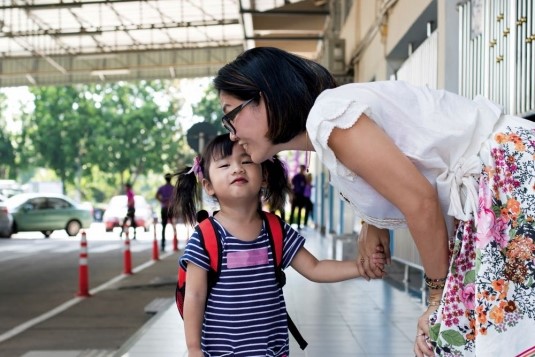Going to school for the first time can be overwhelming for both the parent and the kindergartener. A parent’s worried expression and a child melting down and clinging to her parent at the classroom door are nearly inevitable scenes at schools around the country. It’s called separation anxiety or Kindergartener anxiety, and it’s quite a natural and normal feeling for both parent and child.
There are ways to prepare yourself and your child so that this life transition becomes a positive experience, whether there are meltdowns or not.
First, check in with yourself and how you are feeling about this separation. Are you feeling anxious? Are you having separation anxiety with Kindergarten? Just as it is normal for your child to be feeling anxiety about this transition, it is also normal for you. Your feelings, as well as your child’s feelings, are important and when feelings arise, it is beneficial to tune into them. Take a few minutes to breathe into them calmly. What you are doing is giving your emotions the attention they deserve rather than keeping them bottled up inside. You will likely find that just stopping to pay attention to your feelings and breathing is all you may need to do to feel calmer and more in tune.
One reason it is so important to pay attention to how you are feeling is because children have a radar. You may say one thing, but if your heart or facial expression says the opposite, on some level, that will register with them. If you are calm, confident, and optimistic about how you will handle the Kindergartner anxiety and separation, not only do you transmit that to your child, but you are also letting your child know that you have faith in their abilities. You are also modeling how to deal positively with changes.
Parents are a child’s world and, at this age, they really do listen to what you say and do. So, talk with your child about how much your child is going to do and learn in kindergarten. Convey a positive and warm attitude toward the school and teachers. Most importantly, just as you check in with your own feelings, listen and watch for your child’s feelings and how they express them in words, behavior, art and play. If you see kindergartner anxiety feelings coming up, talk with your child about them and listen to them in return.
We all feel less anxious when we know what to expect. Here are a few practical tips to help prepare for kindergartener anxiety that will ease separation anxiety:
- Visit the school and your child’s classroom before school begins and, if possible, meet with your child’s teacher and the staff. Play on the school playground. Walk around the school, pointing out interesting things and encourage your child to do the same.
- Play separation games such as hide-and-seek. When you find your child, give them a warm hug and let them know that you would look forever to find them and that you are so happy to see them.
- Read books about separation anxiety in kindergarten with your child. This list includes some wonderful ones.
- Make sure your child has plenty of sleep each night. School-age children require 10-11 hours of sleep per night. Poor sleep can lead to mood swings, behavior problems, and even learning difficulties.
- You and your child can lay out their clothes the night before each school day. Have other items, such as shoes, jackets, and lunch boxes, in their place where they are always found the next day.
- In their lunch box, place a family photo or something to remind them of their connection to the family.
Remember that Kindergartener anxiety is a normal feeling. It shows that there is a strong bond between you and your child. Acknowledging the feelings and preparing for the first days of kindergarten will help you and your child experience this new stage in both your lives.
If your child is showing signs of separation anxiety with starting Kindergarten or attending school, reach out to Crossroads Family Counseling Center. We can help you and your child learn skills to manage anxiety through child and play therapy so that your child can successfully start their elementary school years. Contact us today.
